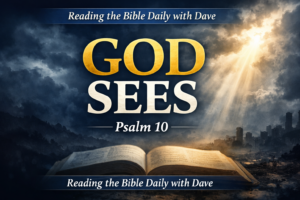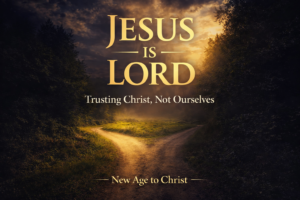⏱️ Estimated Reading Time: 6 min read
Fearing the Almighty
The fear of the Lord is an important concept throughout the storyline of Scripture. Solomon saw the wisdom in fearing God when he said, “The fear of the LORD is a fountain of life, that one may turn away from the snares of death” (Proverbs 14:27). We know we are supposed to fear the Lord – after all, it provides life, as Solomon describes. But what does it mean to fear the Lord? How do we know when we are faithfully fearing or trembling scared?
Throughout Scripture, we see instances of the wrath of God being poured out. In Genesis 6, we see God flooding the earth out of the wickedness of man. In the book of Exodus, we see how the people of God turned their eyes away from Him, and God’s response was wrath. Throughout the Prophets, God calls his people back to himself, and if they refuse, wrath is incoming. We often equate fearing the Lord to his wrath and judgment, which means that we must now, in this view, act and live in a particular manner so that He does not inflict wrath upon us. This type of living makes us look over our shoulders and shudder in fear that God may bring down his judgment. However, as we examine the fear of the Lord more sharply throughout Scripture, we see a different picture. We see a fear that is not shuddering but worshipful. So, what does fearing God look like?
Fearing the Lord Opens our Eyes to See God
Proverbs 1:7 says, “The fear of the Lord is the beginning of knowledge.” Fearing God is foundational to having wisdom and walking in the ways of God. If we are to be people who seek the will of God and try to follow it, we must understand and apply this fear. When done properly, our eyes are open to see who God is.
Yet, as finite people, we often minimize our view of God and equate his nature to being better than ours. Meaning that God is not infinite and all-powerful; rather, he is just morally pure. When this happens, it either eradicates our fear of the Lord or blurs it because our perception is shaped by us rather than God. Here, God is simply a role model for us to aspire to. However, this is not the God of the Scriptures.
Psalms 47:1-2 gives us a picture of what a genuine fear of the Lord should be, “Clap your hands all peoples! Shout to God with loud songs of joy! For the Lord, the Most High, is to be feared, a great king over all the earth.” Verse 1 depicts worship and gladness of heart toward the King. It establishes the fear of the Lord as positive rather than negative. I love the Christian Standard Bible translation of verse 2 that says, “The Lord, the Most High is awe-inspiring.” So, when we look at the Lord in fear, it is not out of shaking and trembling but is one of falling on our faces in awe and reverence of who He is.
Through the book of Exodus, Moses experienced God, and when he did, he fell to his knees in reverence. To fear the Lord is to see Him in all his wondrous attributes and worship him. In Genesis 1, we see his omnipotent (all-powerful) hand at work in creating both the heavens and earth. To be in awe and reverence for our Creator is a powerful thing. Notice the posture of the heart within reverence and how it contrasts against trembling fear. Moses’ posture was one of worship as he saw God. Fearing God requires the same posture of our hearts because it shows us how much we need him. But it also opens the blind eye to see the beauty of the Savior. By fearing God, we can see King Jesus.
Fearing the Lord Properly Aligns our Hearts to Worship
In Exodus 33, Moses pleads with God to show him His glory (33:18). God responds by telling him no one has seen the face of God, but you will see my back when the hand is removed from you. What Moses saw, in part, was the magnitude of God. Because God is so holy, no one can see his face. We saw earlier that when Moses properly feared God by experiencing him (just by seeing his back), he fell on his knees, and the only response was worship (34:8).
While we may not be on top of Mount Sinai experiencing a glimpse of God, the call to experience Him is still potent. Honestly, there are Sundays when the weight of life redirects my heart from worship. The distractions of life seem to outweigh the worship in my mind. Yet, when God grabs ahold of my heart, and I experience his grace and mercy, my only response is worship.
We can worship Him and see His goodness because of the cross. Through the life, death, and resurrection of Jesus, he has freed us from the grip of death and given us a new type of fear. The gospel should stir our hearts every day to experience the fear of God and worship him freely. Awe and reverence for God is the worship he desires and the medicine our weary hearts need.
Seeing God for who He is draws our affections closer to Him, aligning our hearts to worship him rightly. Romans 8:38-39 tells of a beautiful truth in fearing God. It says, “For I am sure that neither death nor life, nor angels nor rulers, nor things present nor things to come, nor powers, nor height nor depth, nor anything else in all creation, will be able to separate us from the love of God in Christ Jesus our Lord.”
This should cause us to fall on our faces in worship. Even when we do not fear Him appropriately, nothing can take us away from God’s all-powerful, all-knowing love in Christ, even when we fail and fall short. Fearing God is a powerful instrument that allows us to see Him and worship Him.




